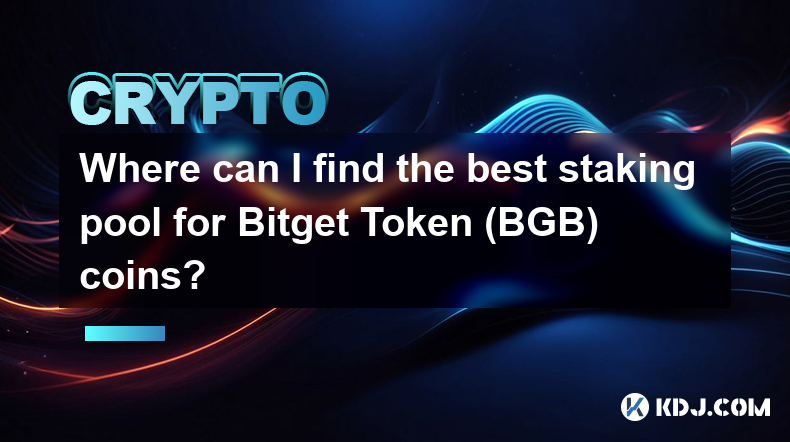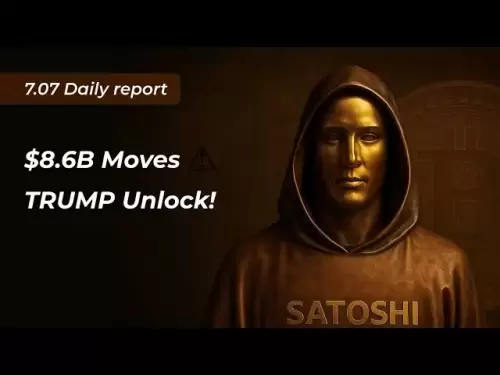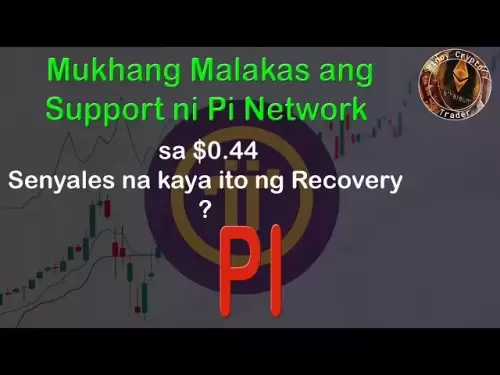-
 Bitcoin
Bitcoin $108,708.8110
0.60% -
 Ethereum
Ethereum $2,561.6057
1.91% -
 Tether USDt
Tether USDt $1.0001
-0.03% -
 XRP
XRP $2.2795
0.57% -
 BNB
BNB $662.2393
1.00% -
 Solana
Solana $153.1346
3.74% -
 USDC
USDC $1.0000
0.00% -
 TRON
TRON $0.2877
0.97% -
 Dogecoin
Dogecoin $0.1710
3.93% -
 Cardano
Cardano $0.5871
1.61% -
 Hyperliquid
Hyperliquid $39.6663
1.68% -
 Sui
Sui $2.9032
0.79% -
 Bitcoin Cash
Bitcoin Cash $496.1879
1.71% -
 Chainlink
Chainlink $13.5807
3.01% -
 UNUS SED LEO
UNUS SED LEO $9.0777
0.61% -
 Stellar
Stellar $0.2514
4.51% -
 Avalanche
Avalanche $18.1761
1.86% -
 Shiba Inu
Shiba Inu $0.0...01173
1.72% -
 Toncoin
Toncoin $2.8010
-4.23% -
 Hedera
Hedera $0.1594
3.21% -
 Litecoin
Litecoin $87.0257
-0.53% -
 Monero
Monero $319.1217
1.79% -
 Polkadot
Polkadot $3.3853
0.68% -
 Dai
Dai $0.9999
-0.01% -
 Ethena USDe
Ethena USDe $1.0003
0.02% -
 Bitget Token
Bitget Token $4.3420
-0.97% -
 Uniswap
Uniswap $7.3772
1.39% -
 Aave
Aave $286.6277
5.61% -
 Pepe
Pepe $0.0...09994
2.33% -
 Pi
Pi $0.4589
1.76%
Where can I find the best staking pool for Bitget Token (BGB) coins?
To choose the optimal BGB staking pool, evaluate factors like reputation, rewards rate, fees, lockup period, and security measures.
Dec 27, 2024 at 03:37 pm

Key Points:
- Choosing the Best Staking Pool Factors
- Recommended Staking Pools for BGB Coins
- Potential Benefits and Risks of Staking BGB
- Frequently Asked Questions about Staking BGB
Choosing the Best Staking Pool Factors:
Staking pools play a crucial role in the Bitget Token (BGB) ecosystem, allowing holders to earn rewards by contributing their tokens to the network. When selecting the best BGB staking pool, consider the following factors:
- Reputation: Check the pool's track record, community feedback, and overall standing within the crypto community.
- Rewards Rate: Determine the estimated annual percentage yield (APY) or expected return on your stake.
- Fees: Understand the fees associated with joining and withdrawing from the pool, as well as any performance or management fees.
- Lockup Period: Some pools require a minimum holding period for your stake, known as the lockup period.
- Security: Ensure the pool employs robust security measures to protect your tokens from unauthorized access or theft.
Recommended Staking Pools for BGB Coins:
Based on the factors mentioned above, here are some recommended staking pools for BGB coins:
- Gate.io: Offers a flexible staking option with no lockup period and an APY of up to 10%.
- Crypto.com: Provides staking for BGB with an APY of up to 8% for a 3-month lockup period.
- Binance: Allows users to stake BGB with a variable APY that currently stands around 5%.
- Huobi Global: Hosts BGB staking with an APY of up to 15% for a lockup period of up to 30 days.
- Coinbase: Features customizable staking terms with APYs ranging from 2% to 4%.
Potential Benefits and Risks of Staking BGB:
Staking BGB offers several potential benefits, including:
- Passive Income: You can earn rewards in the form of additional BGB tokens, providing a passive source of income.
- Network Security: Staking helps secure the Bitget blockchain by providing computational power to verify transactions.
- Community Support: By staking, you contribute to the overall health and growth of the Bitget ecosystem.
However, staking also involves certain risks:
- Volatility: The value of BGB, like other cryptocurrencies, is subject to market fluctuations, potentially leading to losses.
- Lockup Period: In pools with a lockup period, you cannot access your staked BGB until the period expires.
- Technical Issues: While rare, technical issues with the staking pool or underlying blockchain could result in temporary interruptions or loss of rewards.
Frequently Asked Questions about Staking BGB:
Q: What is the minimum amount of BGB required to stake?
A: The minimum staking requirements vary depending on the staking pool. Consult the pool's website or documentation for specific details.
Q: Can I stake BGB from my hardware wallet?
A: It depends on the staking pool and compatible hardware wallets. Check with your staking pool provider for supported hardware wallets.
Q: How often are staking rewards distributed?
A: The distribution frequency of staking rewards varies depending on the staking pool. Some pools distribute rewards daily, while others distribute them weekly or monthly.
Q: Is it possible to lose my BGB coins if I stake them?
A: While unlikely, technical issues or security breaches with the staking pool or underlying blockchain could potentially result in the loss of staked coins.
Disclaimer:info@kdj.com
The information provided is not trading advice. kdj.com does not assume any responsibility for any investments made based on the information provided in this article. Cryptocurrencies are highly volatile and it is highly recommended that you invest with caution after thorough research!
If you believe that the content used on this website infringes your copyright, please contact us immediately (info@kdj.com) and we will delete it promptly.
- Ozak AI Presale: The AI Token Race to $1 and Beyond
- 2025-07-08 00:30:13
- Bitcoin Miners, AI Wars, and the US Learning Curve: A New York State of Mind
- 2025-07-08 00:30:13
- Arctic Pablo: The Meme Coin Melting Crypto in 2025?
- 2025-07-08 00:50:13
- Plume, SkyLink, and Real Yield: Bridging TRON to Real-World Assets
- 2025-07-08 00:50:13
- Bitcoin Whale's Mystery Move: Price Hike Incoming?
- 2025-07-08 00:55:12
- Bitcoin, Jon Atack, and El Salvador: A Crypto Conundrum
- 2025-07-07 23:15:12
Related knowledge

How to customize USDT TRC20 mining fees? Flexible adjustment tutorial
Jun 13,2025 at 01:42am
Understanding USDT TRC20 Mining FeesMining fees on the TRON (TRC20) network are essential for processing transactions. Unlike Bitcoin or Ethereum, where miners directly validate transactions, TRON uses a delegated proof-of-stake (DPoS) mechanism. However, users still need to pay bandwidth and energy fees, which are collectively referred to as 'mining fe...

USDT TRC20 transaction is stuck? Solution summary
Jun 14,2025 at 11:15pm
Understanding USDT TRC20 TransactionsWhen users mention that a USDT TRC20 transaction is stuck, they typically refer to a situation where the transfer of Tether (USDT) on the TRON blockchain has not been confirmed for an extended period. This issue may arise due to various reasons such as network congestion, insufficient transaction fees, or wallet-rela...

How to cancel USDT TRC20 unconfirmed transactions? Operation guide
Jun 13,2025 at 11:01pm
Understanding USDT TRC20 Unconfirmed TransactionsWhen dealing with USDT TRC20 transactions, it’s crucial to understand what an unconfirmed transaction means. An unconfirmed transaction is one that has been broadcasted to the blockchain network but hasn’t yet been included in a block. This typically occurs due to low transaction fees or network congestio...

How to check USDT TRC20 balance? Introduction to multiple query methods
Jun 21,2025 at 02:42am
Understanding USDT TRC20 and Its ImportanceUSDT (Tether) is one of the most widely used stablecoins in the cryptocurrency market. It exists on multiple blockchain networks, including TRC20, which operates on the Tron (TRX) network. Checking your USDT TRC20 balance accurately is crucial for users who hold or transact with this asset. Whether you're sendi...

What to do if USDT TRC20 transfers are congested? Speed up trading skills
Jun 13,2025 at 09:56am
Understanding USDT TRC20 Transfer CongestionWhen transferring USDT TRC20, users may occasionally experience delays or congestion. This typically occurs due to network overload on the TRON blockchain, which hosts the TRC20 version of Tether. Unlike the ERC20 variant (which runs on Ethereum), TRC20 transactions are generally faster and cheaper, but during...

The relationship between USDT TRC20 and TRON chain: technical background analysis
Jun 12,2025 at 01:28pm
What is USDT TRC20?USDT TRC20 refers to the Tether (USDT) token issued on the TRON blockchain using the TRC-20 standard. Unlike the more commonly known ERC-20 version of USDT (which runs on Ethereum), the TRC-20 variant leverages the TRON network's infrastructure for faster and cheaper transactions. The emergence of this version came as part of Tether’s...

How to customize USDT TRC20 mining fees? Flexible adjustment tutorial
Jun 13,2025 at 01:42am
Understanding USDT TRC20 Mining FeesMining fees on the TRON (TRC20) network are essential for processing transactions. Unlike Bitcoin or Ethereum, where miners directly validate transactions, TRON uses a delegated proof-of-stake (DPoS) mechanism. However, users still need to pay bandwidth and energy fees, which are collectively referred to as 'mining fe...

USDT TRC20 transaction is stuck? Solution summary
Jun 14,2025 at 11:15pm
Understanding USDT TRC20 TransactionsWhen users mention that a USDT TRC20 transaction is stuck, they typically refer to a situation where the transfer of Tether (USDT) on the TRON blockchain has not been confirmed for an extended period. This issue may arise due to various reasons such as network congestion, insufficient transaction fees, or wallet-rela...

How to cancel USDT TRC20 unconfirmed transactions? Operation guide
Jun 13,2025 at 11:01pm
Understanding USDT TRC20 Unconfirmed TransactionsWhen dealing with USDT TRC20 transactions, it’s crucial to understand what an unconfirmed transaction means. An unconfirmed transaction is one that has been broadcasted to the blockchain network but hasn’t yet been included in a block. This typically occurs due to low transaction fees or network congestio...

How to check USDT TRC20 balance? Introduction to multiple query methods
Jun 21,2025 at 02:42am
Understanding USDT TRC20 and Its ImportanceUSDT (Tether) is one of the most widely used stablecoins in the cryptocurrency market. It exists on multiple blockchain networks, including TRC20, which operates on the Tron (TRX) network. Checking your USDT TRC20 balance accurately is crucial for users who hold or transact with this asset. Whether you're sendi...

What to do if USDT TRC20 transfers are congested? Speed up trading skills
Jun 13,2025 at 09:56am
Understanding USDT TRC20 Transfer CongestionWhen transferring USDT TRC20, users may occasionally experience delays or congestion. This typically occurs due to network overload on the TRON blockchain, which hosts the TRC20 version of Tether. Unlike the ERC20 variant (which runs on Ethereum), TRC20 transactions are generally faster and cheaper, but during...

The relationship between USDT TRC20 and TRON chain: technical background analysis
Jun 12,2025 at 01:28pm
What is USDT TRC20?USDT TRC20 refers to the Tether (USDT) token issued on the TRON blockchain using the TRC-20 standard. Unlike the more commonly known ERC-20 version of USDT (which runs on Ethereum), the TRC-20 variant leverages the TRON network's infrastructure for faster and cheaper transactions. The emergence of this version came as part of Tether’s...
See all articles

























































































